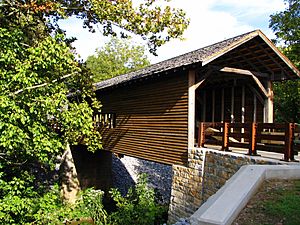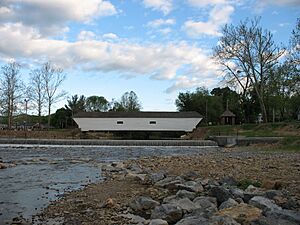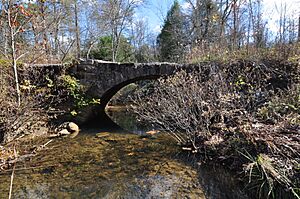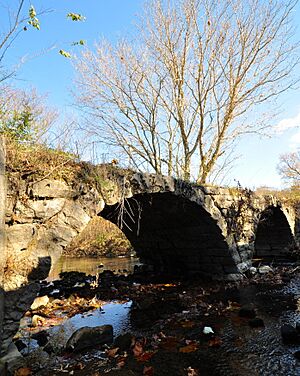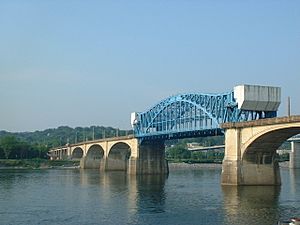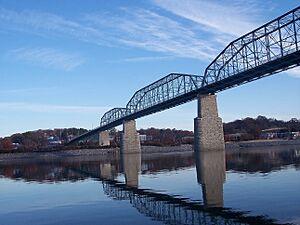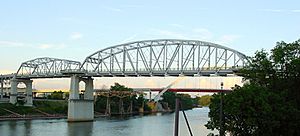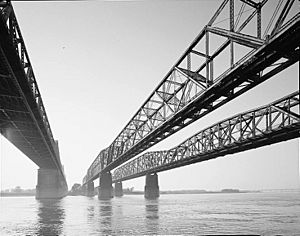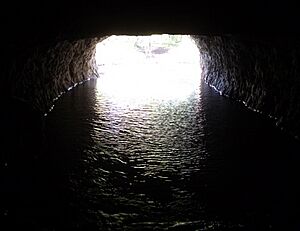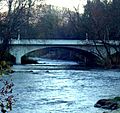List of bridges on the National Register of Historic Places in Tennessee facts for kids
Did you know that many old bridges and tunnels in Tennessee are super special? They are so important that they are listed on something called the National Register of Historic Places. This list helps protect amazing places all over the United States.
When a bridge or tunnel is on this list, it means it has a lot of history. It might be very old, built in a unique way, or connected to important events. Let's explore some of these cool structures in Tennessee!
Contents
Historic Bridges in Tennessee
Tennessee has many different types of bridges. Some are made of stone, some are covered, and some can even move! Each one tells a story about how people traveled and built things long ago.
Covered Bridges: A Peek into the Past
Imagine a bridge with a roof and walls, just like a house! These are called covered bridges. They were built this way to protect the wooden parts from rain and snow. This made them last much longer.
Harrisburg Covered Bridge
The Harrisburg Covered Bridge is a fantastic example. It was built in 1875 in Harrisburg. This bridge is a real treasure because not many covered bridges are left today. It reminds us of a time when horses and buggies crossed rivers.
Elizabethton Covered Bridge
Another famous covered bridge is the Elizabethton Covered Bridge. It's part of the Elizabethton Historic District in Elizabethton. This beautiful bridge was built in 1882. It's a great place to visit and imagine life over a hundred years ago.
Stone Arch Bridges: Built to Last
Stone arch bridges are strong and beautiful. They use curved arches to support the weight, a building method used for thousands of years.
Firescald Creek Stone Arch Bridge
The Firescald Creek Stone Arch Bridge was built in 1906 near Altamont. It's a great example of how people used natural materials like stone to build lasting structures.
Hickory Creek Stone Arch Bridge
Another impressive stone arch bridge is the Hickory Creek Stone Arch Bridge, built in 1912 near Marvin Chapel. These bridges show amazing craftsmanship.
Moving Bridges: Engineering Marvels
Some bridges are designed to move! This allows tall boats to pass underneath without hitting the bridge.
Market Street Bridge (Chattanooga)
The Market Street Bridge in Chattanooga is also known as the Chief John Ross Bridge. It was built in 1917. This bridge is a Bascule bridge, which means a part of it can lift up like a seesaw to let ships go by. It's amazing to see it in action!
Other Notable Bridges
Many other bridges in Tennessee have unique stories.
Walnut Street Bridge (Chattanooga)
The Walnut Street Bridge in Chattanooga was built in 1891. It used to carry cars, but now it's a popular pedestrian bridge. People love to walk or bike across it and enjoy the views of the river.
Shelby Street Bridge
The Shelby Street Bridge in Nashville was built between 1907 and 1909. It's a beautiful truss and girder bridge that spans the Cumberland River. It's a key part of Nashville's history and skyline.
Memphis & Arkansas Bridge
The Memphis & Arkansas Bridge was built in 1949. It's a huge bridge that carries Interstate 55 across the mighty Mississippi River in Memphis. It's a vital link between Tennessee and Arkansas.
Historic Tunnels in Tennessee
Tunnels are like underground roads or pathways. They are often dug through mountains or hills to make travel easier.
Montgomery Bell Tunnel
The Montgomery Bell Tunnel is one of the oldest tunnels in Tennessee, built in 1819 near White Bluff. It's an incredible engineering feat for its time. Imagine digging a tunnel with tools from over 200 years ago!
Chattanooga, Harrison, Georgetown & Charleston Railroad Tunnel
This railroad tunnel was built in 1863 near Chattanooga. It played an important role in connecting different parts of the state by train.
Cumberland Mountain Tunnel
The Cumberland Mountain Tunnel was built between 1849 and 1852 near Cowan. It helped trains travel through the rugged Cumberland Mountains.
Why Are These Places Important?
These bridges and tunnels are more than just old structures. They are reminders of how people lived, worked, and traveled in the past. They show us how engineering and building methods have changed over time. Protecting them helps us learn about our history and appreciate the amazing skills of the builders who came before us.
Images for kids


